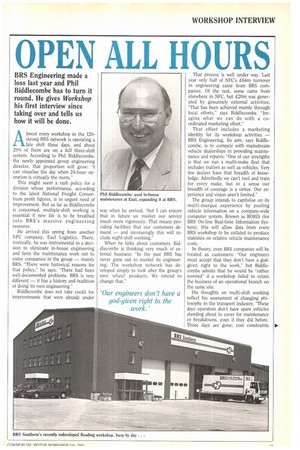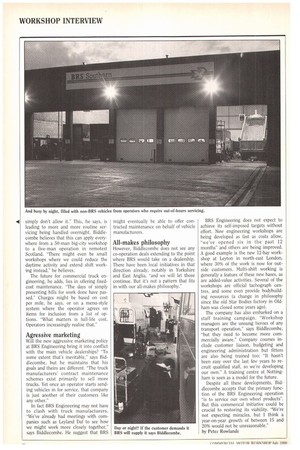OPEN ALL HOURS
Page 107

Page 108

If you've noticed an error in this article please click here to report it so we can fix it.
BRS Engineering made a loss last year and Phil Biddlecombe has to turn it round. He gives Workshop his first interview since taking over and tells us how it will be done.
Almost every workshop in the 120strong BRS network is operating a late shift these days, and about 20% of them are on a full three-shift system. According to Phil Biddlecombe, the newly .appointed group engineering director, that proportion will grow: "I can visualise the day when 24-hour operation is virtually the norm."
This might seem a rash policy for a division whose performance, according to the latest National Freight Consortium profit figures, is in urgent need of improvement. But as far as Biddlecombe is concerned, multiple-shift working is essential if new life is to be breathed into BRS's massive engineering resource.
He arrived this spring from another NFC company, Exel Logistics. There, ironically, he was instrumental in a decision to eliminate in-house engineering and farm the maintenance work out to sister companies in the group — mainly BRS. "There were historical reasons for that policy," he says. "There had been well-documented problems. BRS is very different — it has a history and tradition of doing its own engineering."
Biddlecombe does not take credit for improvements that were already under
way when he arrived, "but I can ensure that in future we market our service much more vigorously. That means providing facilities that our customers demand — and increasingly this will include night-shift working."
When he talks about customers, Biddlecombe is thinking very much of external business: "In the past BRS has never gone out to market its engineering. The workshop network has developed simply to look after the group's own 'wheel' products. We intend to change that." That process is well under way. Last year only half of NFC's .£64m turnover in engineering came from BRS companies. Of the rest, some came from elsewhere in NFC, but £20m was generated by genuinely external activities. "That has been achieved mainly through local efforts," says Biddlecombe. "Imagine what we can do with a coordinated marketing effort."
That effort includes a marketing identity for its workshop activities — BRS Engineering. Its aim, says Biddlecombe, is to compete with mainstream vehicle dealerships in providing maintenance and repairs: "One of our strengths is that we run a multi-make fleet that includes trailers as well as vehicles. Very few dealers have that breadth of knowledge. Admittedly we can't tool and train for every make, but in a sense our breadth of coverage is a virtue. Our experience and vision aren't limited."
The group intends to capitalise on its multi-marque experience by pooling vehicle information on a company-wide computer system. Known as BORIS (for BRS On-line Real-time Information System), this will allow data from every BRS workshop to be collated to produce statistics on relative vehicle maintenance costs.
In theory, even BRS companies will be treated as customers: "Our engineers must accept that they don't have a godgiven right to the work," but Biddlecombe admits that he would be "rather worried" if a workshop failed to retain the business of an operational branch on the same site.
His thoughts on multi-shift working reflect his assessment of changing philosophy in the transport industry. "These days operators don't have spare vehicles standing about to cover for maintenance or breakdowns, even if they did before. Those days are gone; cost constraints simply don't allow it." This, he says, is leading to more and more routine servicing being handled overnight. Biddlecombe believes that this can apply everywhere from a 50-man big-city workshop to a five-man operation in remotest Scotland. "There might even be small workshops where we could reduce the daytime activity and extend shift working instead," he believes.
The future for commercial truck engineering, he adds, lies in offering fixedcost maintenance. "The days of simply presenting bills for work done have passed." Charges might be based on cost per mile, he says, or on a menu-style system where the operator agrees on items for inclusion from a list of options. "What matters is full-life cost. Operators increasingly realise that."
Agressive marketing
Will the new aggressive marketing policy at BRS Engineering bring it into conflict with the main vehicle dealerships? "To some extent that's inevitable," says Biddlecombe, but he maintains that his goals and theirs are different. "The truck manufacturers' contract maintenance schemes exist primarily to sell more trucks. Yet once an operator starts sending vehicles in for service, that company is just another of their customers like any other."
In fact BRS Engineering may not have to clash with truck manufacturers. "We've already had meetings with companies such as Leyland Daf to see how we might work more closely together," says Biddlecombe. He suggest that BRS might eventually be able to offer contracted maintenance on behalf of vehicle manufacturers.
All-makes philosophy
However, Biddlecombe does not see any co-operation deals extending to the point where BRS would take on a dealership. There have been local initiatives in that direction already, notably in Yorkshire and East Anglia, "and we will let those continue. But it's not a pattern that fits in with our all-makes philosophy." BRS Engineering does not expect to achieve its self-imposed targets without effort. New engineering workshops are being developed as fast as costs allow, "we've opened six in the past 12 months" and others are being improved. A good example is the new 12-bay workshop at Leyton in north-east London, where 3096 of the work is now for outside customers. Multi-shift working is generally a feature of these new bases, as are added-value activities. Several of the workshops are official tachograph centres, and some even provide bodybuilding resources (a change in philosophy since the old Star Bodies factory in Oldham was closed some years ago).
The company has also embarked on a staff training campaign. "Workshop managers are the unsung heroes of any transport operation," says Biddlecombe, "but they need to become more commercially aware." Company courses include customer liaison, budgeting and engineering administration but fitters are also being trained too: "It hasn't been easy over the last few years to recruit qualified staff, so we're developing our own." A training centre at Nottingham is seen as a model for the future.
Despite all these developments, Biddlecombe accepts that the primary function of the BRS Engineering operation "is to service our own wheel products". But this commerical initiative could be crucial to restoring its viability. "We're not expecting miracles, but I think a year-on-year growth of between 15 and 20% would not be unreasonable."
by Peter Rowlands




















































































































